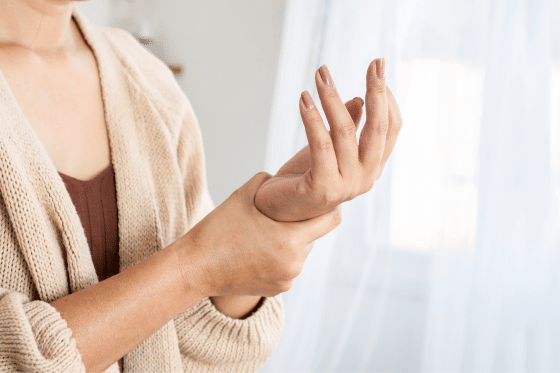It often starts subtly—a mild tingling in the toes or a sensation of pins and needles in the fingertips. For many adults over 45, tingling and numbness in feet and hands become more noticeable over time. While it might be easy to dismiss these sensations as “just getting older,” they can be your body’s way of signaling that it needs support.
As a physical therapist at MORGAiN Physical Therapy, I’ve worked with many people who’ve experienced changes in how their body feels, moves, and functions. One of the most common concerns I hear is about tingling and numbness in feet and hands—and what it might mean for long-term mobility and independence.
In this post, we’ll break down what causes these sensations, why they matter, and natural ways to support nerve health that can make a real difference in daily life.
What Causes Tingling and Numbness in Feet and Hands?
Tingling and numbness in feet and hands often occur when nerves are irritated, compressed, or not functioning at their best. This can happen for a variety of reasons, such as:
- Nerve compression from posture or repetitive movements
- Reduced circulation to the limbs
- Prolonged sitting or standing
- Muscle imbalances or joint restrictions
- Age-related changes in the nervous system
Sometimes, these sensations can be linked to more complex issues, which is why it’s important to pay attention to the signals your body is sending.
Why These Sensations Shouldn’t Be Ignored
While occasional tingling might not seem like a big deal, frequent or worsening tingling and numbness in feet and hands can impact balance, grip strength, coordination, and confidence during everyday tasks.
Left unaddressed, these sensations may affect your ability to walk safely, hold items steadily, or stay active doing the things you enjoy—gardening, golfing, or simply getting outside for a walk.
At MORGAiN Physical Therapy, we believe that prevention and early support can make all the difference in maintaining quality of life.
Natural Ways to Support Nerve Health
The good news is, there are practical, natural strategies that can help support the body’s nervous system and overall function. Here are a few we often recommend in the clinic:
1. Gentle Movement and Stretching
Regular movement increases circulation and helps reduce pressure on the nerves. Stretching key muscle groups in the neck, shoulders, hips, and legs can relieve tension that may be affecting nerves.
2. Improve Posture and Ergonomics
Poor posture—especially during sitting or standing for long periods—can compress nerves in the spine and limbs. Small changes like adjusting chair height, using lumbar support, and taking breaks from sitting can help reduce nerve stress.
3. Nutritional Support for Nerve Function
Certain nutrients, including B vitamins and omega-3 fatty acids, play a role in nerve health. While dietary changes should always be discussed with a healthcare provider, many clients find that eating a balanced, nutrient-rich diet contributes to overall energy and mobility.
4. Stay Active With Low-Impact Exercise
Walking, swimming, or using a stationary bike are excellent ways to keep blood flowing to the hands and feet. Activity helps maintain muscle strength, joint health, and better circulation—all important for supporting nerves.
5. Guided Physical Therapy
A guided movement assessment can identify subtle changes in posture, balance, and strength that may be contributing to tingling and numbness in feet and hands. We work with adults to create personalized strategies that fit their lifestyle and activity goals.
Book a Free Telephone Consultation
If you’ve noticed tingling and numbness in feet and hands becoming more common, it’s worth getting in touch. Many people don’t realize how interconnected the spine, posture, and movement habits are with nerve health. Even small adjustments in how you move or sit can have a noticeable impact.
Schedule a free telephone consultation and we’ll answer your questions, learn more about your goals, and help you decide if an in-person assessment makes sense for you.
Click here or call (701) 599-3848 to book your free telephone consultation—because feeling good in your movement starts with understanding what your body needs.
More free resources:
Download our free wellness guide!
Read our blog – Understanding Neuropathy: What It Means and Why It Matters – Morgain Physical Therapy
Read our blog – Understanding Neuropathy and Its Emotional Impacts – Morgain Physical Therapy

